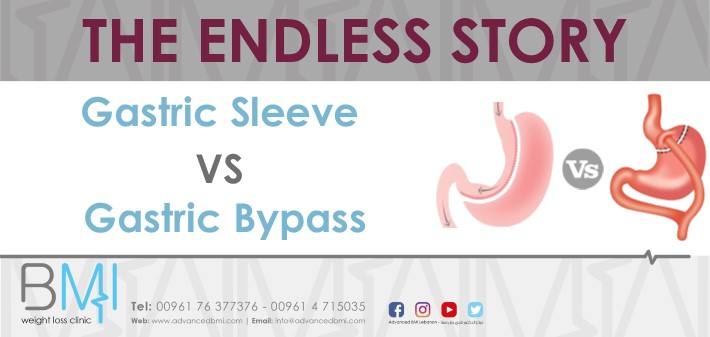Gastric Sleeve Vs Gastric Bypass: What is the Difference and what’s best option for me?
The eternal question: Gastric Sleeve Vs Gastric Bypass. If you are struggling to lose weight and you’re tired of the endless dieting, commercial weight-loss programs (magic pills) and all the other usual methods; maybe it is time you considered weight loss surgery. Your health will thank you.
Because of their success rates in aiding weight-loss and their relative simplicity, most obese patients who consider undergoing bariatric surgery as a treatment for their obesity are often torn between these two procedures; the gastric sleeve and the gastric bypass .
If this is you, this information may help you decide what kind of surgery between the two will work best for you or if you may need to consider other weight loss procedures.
The Gastric Bypass Surgery
This procedure basically involves removing (stapling) a larger part of the stomach and creating a smaller pouch which will only be able to hold in small portions of food at any time. This means that after this procedure, you will need to eat smaller portions of food because your stomach will have been altered to accommodate less food.
Less nutrients and calories will also be absorbed into the body because the food you eat will bypass a larger portion of your stomach and smaller intestines.
Advantages
One advantage of the gastric bypass is that it usually causes a very quick and substantial weight-loss. Compared to the gastric sleeve and other bariatric procedures like the duodenal switch, the gastric bypass is also minimally invasive. It is ideal for moderately and severely obese patients who wish to have permanent solution for their obesity.
Disadvantages
This procedure has also has its drawbacks. Like the gastric sleeve, once it is done, it is almost impossible to reverse. It is invasive and restrictive. It may also not be very ideal for women who would wish to get pregnant soon after the weight-loss surgery.
One other disadvantage the gastric bypass has is that it is mal-absorptive. Because most of the food consumed bypasses a large portion of the digestive system, the amount of calories as well as the nutrients absorbed into the body is greatly reduced.
Because of its mal-absorptive nature, patients who opt for gastric bypass are more likely to experience nutrient deficiencies especially if they do not take their nutrient supplements consistently.
The Gastric Sleeve Surgery
Sleeve gastrectomy basically involves a substantial removal of the side portion of the stomach such that only a very small portion of the stomach(the size of a banana) remains after the surgery.
This procedure works by restricting the amount of food a person who has had the surgery can eat at any one time. It makes one feel full longer hence reducing the urge to eat. This stimulates the body to convert stored fats to provide energy.
Its main difference compared to the gastric bypass surgery is that with this procedure, food still passes through the entire length of the intestine. The size of the stomach (sleeve) that remains after the surgery is also considerably smaller.
Advantages
With the gastric sleeve surgery, the entire left portion of the stomach is removed. This is also where the hormone responsible for stimulating feelings of hunger is found. Once this part of the stomach is removed, it also means that the hormone is removed.
This is why obese patients who opt for gastric sleeve surgery rarely experience hunger pangs after the procedure is done.
Another advantage of the gastric sleeve is that after the surgery; patients experience less stretchmarks and flabby skin. This is mainly because of the slower rate but consistent weight-loss.
Disadvantages
Like the gastric bypass, the gastric sleeve is invasive and irreversible. This means that once it is done, the patient has to live with it. You don’t have the option of changing your mind.
Weight-loss is also gradual and you will have to wait a bit longer to notice any substantial difference.
Because of this, it may not be an ideal choice for obese patient who need bariatric surgery in order to reverse co-morbidities like Type 2 diabetes and high blood pressure.
Gastric Sleeve Vs Gastric Bypass: Recovery Time
Gastric Sleeve
There is not much difference in recovery time in gastric sleeve and the gastric bypass surgeries. This however can vary from patient to patient. You may need to spend a night or two in hospital and another two-three weeks at home.
Gastric bypass
Since this procedure is considered a bit invasive as well, you may have to stay two or three nights in the hospital. Don’t worry (if you choose Advanced BMI, we’ll take very good care of you). Recovery time usually takes longer but you will be able to get back to work within two or four weeks at most.
Gastric Sleeve Vs Gastric Bypass: Long-term Weight-loss
With gastric sleeve, weight loss occurs gradually over a longer period of time.
Although patients who choose the gastric bypass surgery tend to lose more weight compared to patients who choose gastric sleeve surgery within the first year after surgery, the weight loss achieved over a longer period of time is almost the same regardless of the procedure chosen.
Both procedures have unique advantages and disadvantages that them ideal for different people depending on their needs. They are both considered effective weight-loss surgeries.
In the end, Gastric Sleeve Vs Gastric Bypass is an endless discussion subject, and the best weight-loss option will be up to individual patients.
If you’re finding it difficult making a choice between the gastric sleeve surgery and the gastric bypass or any of the other bariatric procedures, feel free to talk to us. We will be happy to be of help.









